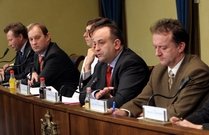- Serbia
Get to know Serbia
- Citizens
Culture and science
Health services
Pension and disability insurance
- Business
Employment
Economy
- Media
- Government
- Contact
Keep in touch
Contact form
Back
Keepin touch
Whether you have a question, comment, suggestion or any problem in the purview of the government, send us your message and we will try to respond as soon as possible. If your problem is not in our purview, we will forward your message to the relevant institution.
Q:
A:
Joining WTO one of the conditions for Serbia’s EU membership
Belgrade,
18 October 2005
Serbian Minister of International Economic Relations Milan Parivodic said today that it is very important for Serbia to join the World Trade Organisation (WTO) since it is one of the conditions for Serbia’s membership in the European Union. He added that it is expected that the membership will be approved in 2008.
Speaking at a press conference Parivodic said that in September 2004 Serbia presented its request for joining the WTO as an independent customs zone, and in February this year the WTO agreed to consider the request and on October 7th, the first meeting of the working group for Serbia’s accession to the WTO was held.
He said that Serbia will present the adjusted specific duty rates for individual goods until the end of this year, while the second meeting of the working group is expected to take place in the first half of 2006.
Parivodic said that the basic principles of the WTO are: “national treatment” of foreign businessmen, transparency, predictability of rules and economic policies, and conditions that also give Serbian businessmen the chance to access foreign markets.
Assistant Minister Dusko Lopandic said that negotiations with the WTO will enhance trade and services and minimise taxes, thus increasing competition, improving the business climate, accelerating economic growth and attracting larger foreign investment.
Lopandic announced that a two-day conference on Serbia’s accession to the WTO begins tomorrow at the Hotel Intercontinental in Belgrade. The aim of this conference is to inform Serbian businessmen of the advantages to be gained by joining the WTO.
Chairman of the working group for Serbia’s accession to the WTO, Francois Roux said today that the expectation of Serbian officials for Serbia’s accession to the WTO in 2008 is ambitious but realistic.
He said that this ambition can be realised under condition that the Serbian government and its ministries have a continuous coordinated approach that they will pursue to the end.
Roux said that Serbia is at a good starting point because it was one of the first members of GATT, an organisation that was the predecessor of the WTO, as well as in that it has a highly educated public and a devoted government.
Counsellor in the secretariat of the WTO Adrian Cato said that Serbia could become a member of the WTO in a period of three to five years, depending on readiness for negotiations and the opening up of the domestic economy.
He said that Serbia will present the adjusted specific duty rates for individual goods until the end of this year, while the second meeting of the working group is expected to take place in the first half of 2006.
Parivodic said that the basic principles of the WTO are: “national treatment” of foreign businessmen, transparency, predictability of rules and economic policies, and conditions that also give Serbian businessmen the chance to access foreign markets.
Assistant Minister Dusko Lopandic said that negotiations with the WTO will enhance trade and services and minimise taxes, thus increasing competition, improving the business climate, accelerating economic growth and attracting larger foreign investment.
Lopandic announced that a two-day conference on Serbia’s accession to the WTO begins tomorrow at the Hotel Intercontinental in Belgrade. The aim of this conference is to inform Serbian businessmen of the advantages to be gained by joining the WTO.
Chairman of the working group for Serbia’s accession to the WTO, Francois Roux said today that the expectation of Serbian officials for Serbia’s accession to the WTO in 2008 is ambitious but realistic.
He said that this ambition can be realised under condition that the Serbian government and its ministries have a continuous coordinated approach that they will pursue to the end.
Roux said that Serbia is at a good starting point because it was one of the first members of GATT, an organisation that was the predecessor of the WTO, as well as in that it has a highly educated public and a devoted government.
Counsellor in the secretariat of the WTO Adrian Cato said that Serbia could become a member of the WTO in a period of three to five years, depending on readiness for negotiations and the opening up of the domestic economy.
-
 Belgrade, 26 November 2025
Belgrade, 26 November 2025Serbia-Hungary partnership best example of European cooperation
-
 Belgrade, 22 January 2025
Belgrade, 22 January 2025Egypt one of Serbia’s closest partners on international stage
-
 Belgrade, 9 July 2024
Belgrade, 9 July 2024Support for 104 associations in diaspora that preserve Serbian language, culture
-
 Belgrade, 15 April 2024
Belgrade, 15 April 2024Competition for StarTech grants open until 31 May
-
 Belgrade, 2 October 2023
Belgrade, 2 October 2023Serbia respects Resolution 1244 and will do everything to preserve peace
-
 Belgrade, 13 September 2023
Belgrade, 13 September 2023Day of Serbian Unity to be celebrated outside borders of Serbia, Republika Srpska for the first time
-
 Belgrade, 8 August 2023
Belgrade, 8 August 2023RSD 24.2m in state aid paid out to citizens affected by storm
-
 Belgrade, 17 June 2023
Belgrade, 17 June 2023Belgrade is doing everything to preserve peace in Kosovo and Metohija
-
 Belgrade, 15 June 2023
Belgrade, 15 June 2023Slovenia will continue to support Serbia on its way to EU
-
 Belgrade, 5 May 2023
Belgrade, 5 May 2023Emergency measures, tightening of conditions for possessing weapons

